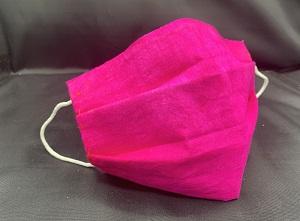
Photo: When activated by daylight, a new type of cotton face mask releases reactive oxygen species (ROS) that kill viruses and bacteria.
view more
Credit Image: Adapted from ACS Applied Materials & Interfaces 2020, DOI: 10.1021/acsami.0c15540
During the COVID-19 pandemic, many people have become accustomed to wearing cotton face masks in public places. However, viruses and bacteria that stick to the mask could be transferred elsewhere when the wearer removes or touches it. Now, researchers reporting in ACS Applied Materials & Interfaces have developed a special type of cotton face mask that kills up to 99.9999% of bacteria and viruses within 60 minutes of daylight exposure.
Face masks made of various cloth materials can filter nanoscale aerosol particles — such as those released by a cough or sneeze — potentially helping to reduce the spread of diseases, including COVID-19. But live bacteria and viruses on the surface of the mask could still be contagious. Peixin Tang, Gang Sun, Nitin Nitin and colleagues wanted to develop a new cotton fabric that would release reactive oxygen species (ROS) when exposed to daylight, killing microbes attached to the fabric’s surfaces while being washable, reusable and safe for the wearer. Then, a person could disinfect their cloth mask during their lunch hour outside in the sun, or by spending a longer period of time under office or building lights, which are much less intense than sunlight.
The researchers made their antimicrobial fabrics by attaching positively charged chains of 2-diethylaminoethyl chloride (DEAE-Cl) to ordinary cotton. Then, they dyed the modified cotton in a solution of a negatively charged photosensitizer (a compound that releases ROS upon exposure to light), which attached to the DEAE chains by strong electrostatic interactions. The team found that a fabric made with a dye called rose Bengal as the photosensitizer killed 99.9999% of bacteria added to the fabric within 60 minutes of daylight exposure and inactivated 99.9999% of T7 bacteriophage — a virus thought to be more resistant to ROS than some coronaviruses — within 30 minutes. Further testing showed that the material could be handwashed at least 10 times and constantly exposed to daylight for at least 7 days without losing its antimicrobial activity. The fabric shows promise for making reusable, antibacterial/antiviral cloth face masks and protective suits, the researchers say.
###
The authors acknowledge funding from the COVID-19 Research Accelerator Funding Track Program at the University of California, Davis and the California Department of Pesticide Regulation.
The abstract that accompanies this paper can be viewed here.
The American Chemical Society (ACS) is a nonprofit organization chartered by the U.S. Congress. ACS’ mission is to advance the broader chemistry enterprise and its practitioners for the benefit of Earth and its people. The Society is a global leader in providing access to chemistry-related information and research through its multiple research solutions, peer-reviewed journals, scientific conferences, eBooks and weekly news periodical Chemical & Engineering News. ACS journals are among the most cited, most trusted and most read within the scientific literature; however, ACS itself does not conduct chemical research. As a specialist in scientific information solutions (including SciFinder® and STN®), its CAS division powers global research, discovery and innovation. ACS’ main offices are in Washington, D.C., and Columbus, Ohio.
To automatically receive news releases from the American Chemical Society, contact [email protected].
Follow us: Twitter | Facebook
TDnews (tunisiesoir.com)














